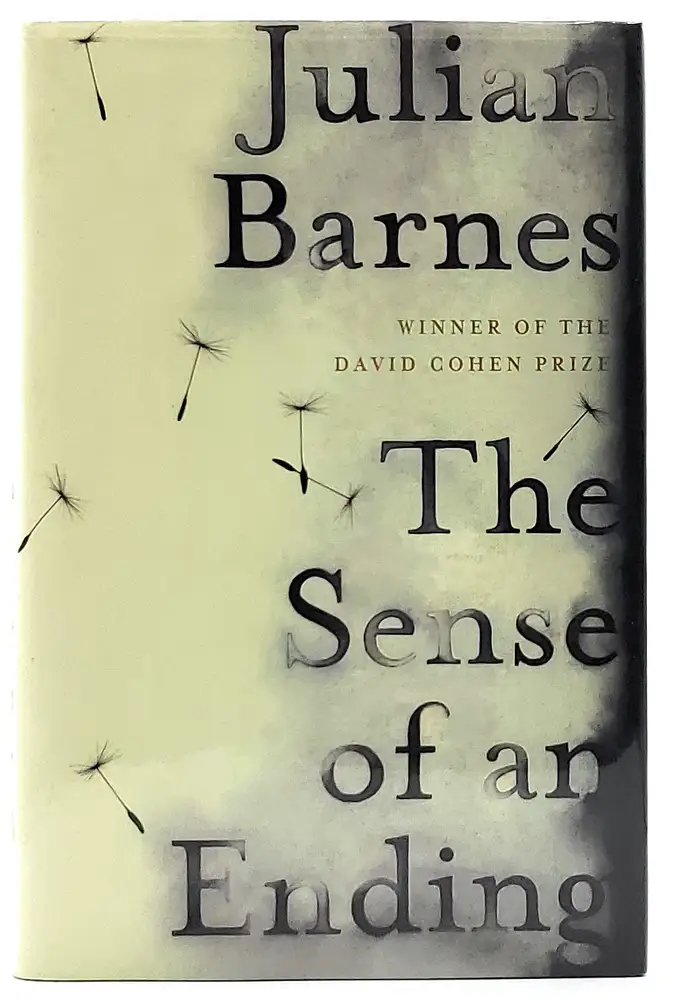The DECODER series — to which SEMIOVOX has invited our semiotician colleagues from around the world to contribute — explores fictional semiotician-esque action as depicted in books, movies, TV shows, etc.
During the mid-1960s, four boys live on the outskirts of London. They are close friends until graduation, when their life paths diverge. They write letters to one another, fall in love, experience breakups, and become disillusioned. So far, the story (narrated by one of the four, Tony) is a rather ordinary one. Then Adrian, the smartest member of the group, commits suicide. It’s the most rational choice, the intellectual decision, Adrian insists — since suicide is the only truly “philosophical subject.”
The end. Or is it?
Forty years later, Tony receives a letter from a law firm informing him that he has inherited Adrian’s diary, along with a small sum of money. The situation is as puzzling as it is troublesome because the diary is being held by Veronica, Tony’s ex-girlfriend. (Veronica was involved Adrian, for a while, just before he committed suicide.) When she sends him some fragments of the diary, Tony embarks upon a journey into the past — one that changes his perception of long-forgotten events, and leads him to reinterpret their meaning.
There are no facts, only interpretations, according to Nietzsche; Tony learns the truth of this. How had their history instructor answered when he’d knowingly claimed that history was the lies of the victors? “As long as you remember that it is also the self-delusions of the defeated.” (Do we remember that enough when it comes to our own lives? he wonders.) Interpretation is never merely semiotic; as Tony learns, it’s always an ethical action, an action full of moral consequences. His story is a tale of errors in interpretation, of its openness, and of the interpreter’s responsibility. As it unfolds, new pieces of information shift the image on Tony’s interpretive map, revealing further layers of meaning and their consequences. When we reveal something, what are we concealing — from ourselves and from others?
Barnes’s thesis about the moral consequences of interpretation is accompanied by a diagnosis that we cannot escape our cultural, social, or psychological conditioning. All too easily, the mind drifts back onto familiar paths.
The Sense of an Ending won the Booker Prize, precisely because (one assumes) it speculates on our compulsion to interpret. Semioticians recognize this compulsion — but how cognizant are we of the ethical dangers associated with interpretation, the distortion of perception, and the illusions to which we are prone?
DECODER: Adelina Vaca (Mexico) on ARRIVAL | William Liu (China) on A.I. ARTIFICIAL INTELLIGENCE | Tim Spencer (England) on VURT | Ramona Lyons (USA) on BABEL-17 | Rachel Lawes (England) on NICE WORK | Alfredo Troncoso (Mexico) on THE ODYSSEY | Gabriela Pedranti (Spain) on MUSIC BOX | Charles Leech (Canada) on PATTERN RECOGNITION | Lucia Laurent-Neva (England) on LESSONS IN CHEMISTRY | Whitney Dunlap-Fowler (USA) on THE GIVER | Colette Sensier (England / Portugal) on PRIESTDADDY | Jamin Pelkey (Canada) on THE WONDER | Maciej Biedziński (Poland) on KOSMOS | Josh Glenn (USA) on LE GARAGE HERMÉTIQUE | Antje Weißenborn (Germany) on BABYLON BERLIN | Ximena Tobi (Argentina) on SIX FEET UNDER | Mariane Cara (Brazil) on ROPE | Maria Papanthymou (Greece) on MY FAMILY AND OTHER ANIMALS | Chirag Mediratta (India) on BLEACH | Dimitar Trendafilov (Bulgaria) on THE MATRIX | Martha Arango (Sweden) on ONE HUNDRED YEARS OF SOLITUDE | Becks Collins (England) on THE HITCHHIKER’S GUIDE TO THE GALAXY | Ivan Islas (Mexico) on THE NAME OF THE ROSE | Paulina Goch-Kenawy (Poland) on THE SENSE OF AN ENDING | Eugene Gorny (Thailand) on SHUTTER ISLAND & FRACTURED.
Also see these global semio series: COVID CODES | SEMIO OBJECTS | MAKING SENSE | COLOR CODEX | DECODER | CASE FILE | PHOTO OP | MEDIA DIET.


